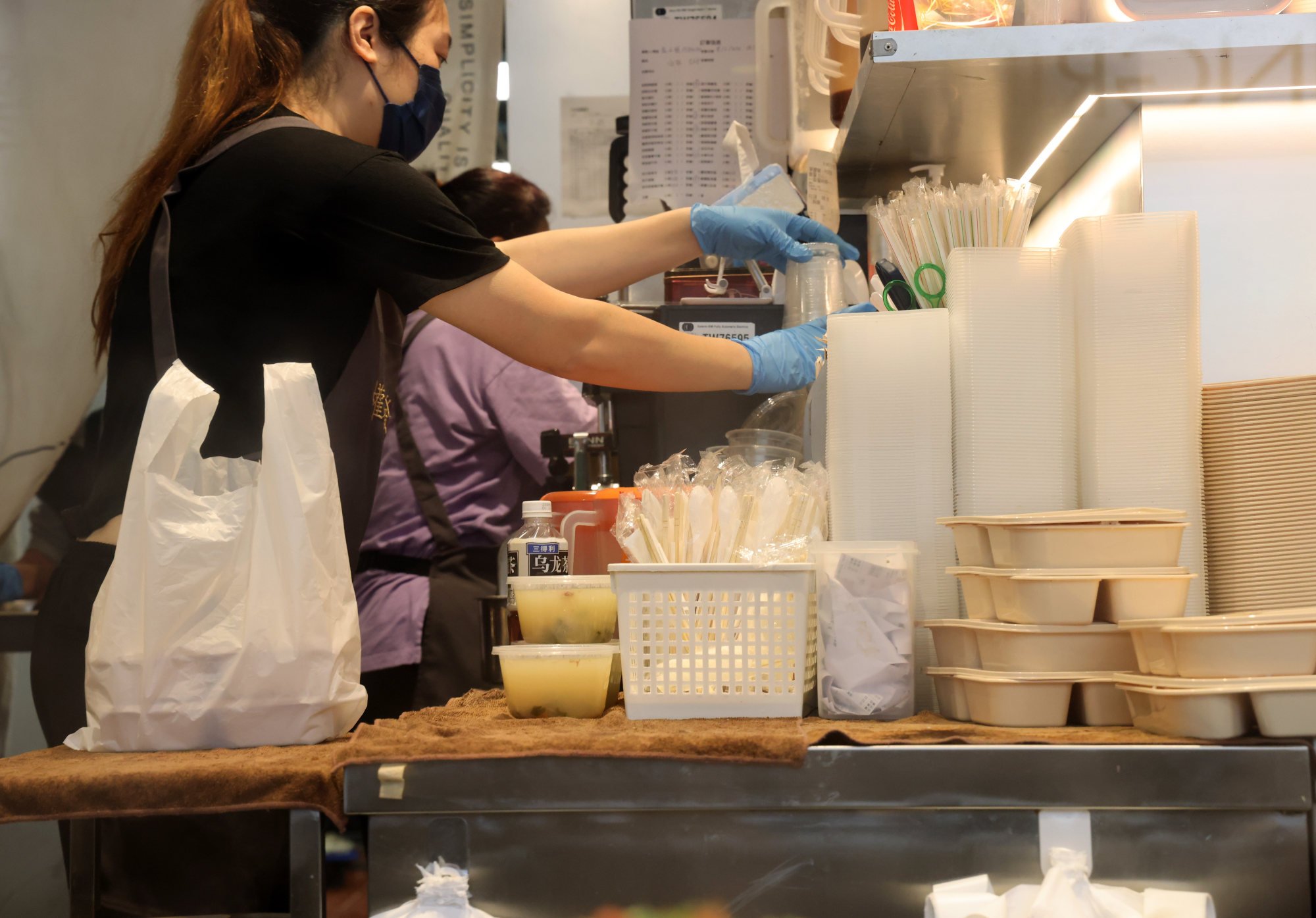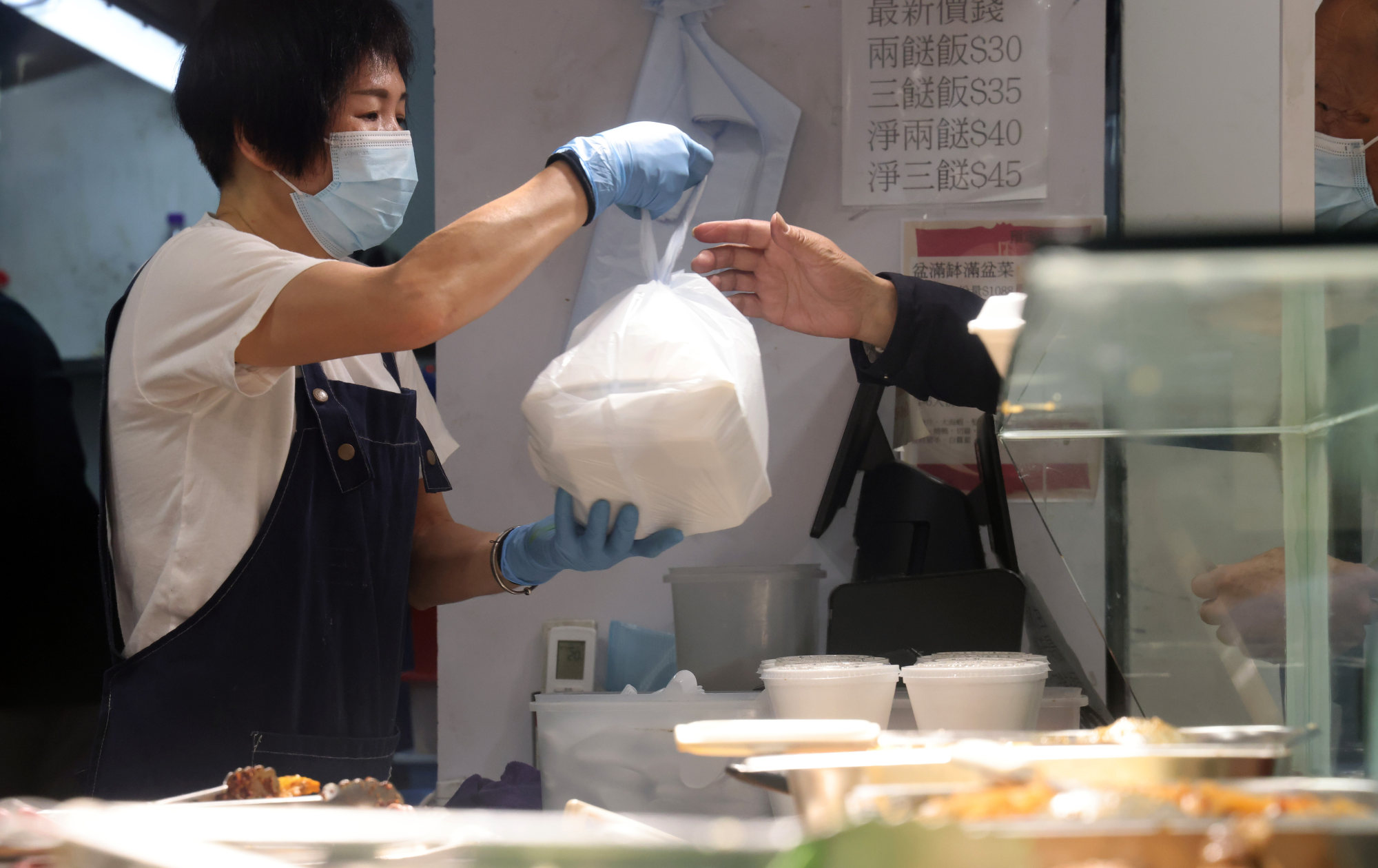
Explainer | Hong Kong’s ban on single-use plastics begins on Monday. The Post explains what you need to know
- Restaurants will not offer disposable plastic straws, stirrers, cutlery or plates for dine-in and takeaway services when ban’s first stage kicks off on April 22
- Those who breach the ban are subject to a maximum fine of HK$100,000
Authorities said most major chain restaurants had already switched to paper- and wood-based alternatives, while the Post observed that smaller eateries and guest houses were still lagging behind given there would be a six-month grace period.
Here, the Post explains what you need to know about the ban that is coming into force.
1. Which premises are targeted?
The new law does not target individuals but rather the providers and sellers of disposable plastic such as restaurants, hotels and retailers, as well as physical stores and local online platforms. Use of the items by people in offices and other private premises will not be regulated.
2. What types of products are covered?
The first phase mainly targets expanded polystyrene receptacles and other disposable plastic tableware considered too small and difficult to recycle, such as stirrers, straws, knives, forks, spoons and plates.
Starting on April 22, restaurants cannot offer customers any polystyrene products, disposable plastic straws, stirrers, cutlery or plates for dine-in or takeaway. They are not allowed to provide single-use cups, cup lids or food containers to dine-in customers.
The first phase also covers products with non-plastic alternatives, such as cotton buds, umbrella covers and glow sticks.
Meanwhile, hotels and guest houses will be barred from supplying free toiletries in synthetic disposable containers and free in-room water in plastic bottles.

3. How will diners be affected?
Restaurants will still be able to put food or drinks in throwaway plastic containers for takeaway orders after the ban comes into force, but the items cannot be made of styrofoam.
Simon Wong Kit-lung, the honorary president of the Institute of Dining Professionals, said the industry had told authorities it could not control what consumers did, especially when they ordered takeaway food but later decided to eat at the location.
He added that restaurants might put up signs to remind customers not to eat their takeaway food in the dining areas.
“Customers should also understand the ban so we won’t fall foul of the law,” he said.
4. What are the changes for hotels?
Hotels will not be able to provide free plastic items, such as toothbrushes, throwaway razors, nail files, single-use combs, shower caps, bottles of water or toiletries.
Caspar Tsui Ying-wai, the chief executive of the Federation of Hong Kong Hotel Owners, said many hotels had instead started to offer shampoo, conditioner and body wash in larger reusable pump bottles.
Some hotels had also installed water dispensers for guests, he added.
A Post reporter observed some had started providing drinking water in glass bottles or putting large bottles in rooms so guests could refill them using filtered tap water.
“There are still some items that we find hard to source, such as razors,” he said. “Instead, we will charge our guests a small amount of money if they need a new razor.
“We may no longer offer shower caps because it is difficult to find an alternative.”
Tsui said the government would put up signs at immigration checkpoints and hotels to remind travellers to bring their own personal hygiene products.
5. What items will be exempted and why?
Pre-packed food that has utensils attached to it, such as instant noodles and ice cream, and packaged beverages with plastic straws will be exempted.
Authorities said an exemption would only apply if tableware was part of the commodity or added during the manufacturing process.
Restaurants and retailers could give disposable plastic straws to customers with special medical needs, the government said, without providing examples.
Places, such as hospital wards and correctional facilities, can also offer disposable plastic tableware due to medical or security needs.
The government will also exempt the sale and free distribution of single-use plastic products under “specific circumstances”, including medical or public health needs, scientific, forensic or study purposes, security and public security reasons, and other emergencies.
Hong Kong to delay first phase of ban on plastic tableware at restaurants
6. Who will be liable to penalties?
The law does not regulate the public.
According to the Product Eco-responsibility Ordinance, those who breach the ban are subject to a maximum fine of HK$100,000 (US$12,800).
A fixed penalty system will be introduced, where law enforcement officers are entitled to issue HK$2,000 tickets to those retailers or people in charge of such catering premises.
The government called on the catering industry to adopt eco-friendly alternatives, such as paper or plant fibre, as soon as possible. The Environment and Ecology Bureau has created an online platform for the food and beverage sector, tableware suppliers and the public to refer to.
Hong Kong ban on single-use plastic tableware to start on April 22 next year
7. Can you use your own containers for takeaway?
Environmental authorities launched a scheme last September to encourage restaurants to accept customers’ own boxes or cups when they ordered takeaway food and drink, or to loan out reusable containers.
A check by the Post on the scheme’s official website earlier found that about 470 restaurants had joined, a fraction of the close to 13,000 in the city.
Industry leader Wong said the scheme was unpopular and few customers brought their own containers. He explained many restaurant items were pre-made and pre-packed, making it difficult for them to work outside standard operating procedures.
“It is still manageable if only several people bring their own boxes,” he said. “But the efficiency will be lower if everyone does that.
“You don’t want your fast food to turn into slow food.”
Wong added hygiene was another potential pitfall because containers supplied by customers might be contaminated and introduce germs and bacteria into restaurant kitchens.
“The legal risk is too huge,” he said. “We can’t afford to have food poisoning.”
8. What are the reasons for the ban?
Government statistics showed that out of the 10,809 tonnes of municipal solid waste discarded each day in the city’s landfills in 2020, 21 per cent were plastics. It turned authorities’ policymaking direction towards reducing plastic use “at source”.
“Plastics can stay in the environment for a very long period, causing far-reaching threats to the environment and ecology,” environment authorities said in a paper submitted to the Legislative Council last year.
In a two-month public consultation conducted by the Environmental Protection Department in 2021, more than 90 per cent of the 8,552 respondents supported progressively regulating disposable plastic tableware by legislation.
Last March, representatives from 175 countries passed a resolution at the United Nations Environment Assembly to draft an international treaty aiming at alleviating plastic pollution.
The resolution stipulated that all the 175 member states had to develop a legally binding agreement on plastic pollution before the end of this year – it has been considered a “major step” towards reducing greenhouse gas emissions from the production, use and disposal of plastics.

9. When will Hong Kong launch the second phase?
Phase two, which could start as early as 2025, will ban all use of throwaway plastics in restaurants, plastic food containers, six-pack yokes for canned drinks, tablecloths, disposable gloves and plastic-stemmed dental floss.
Free distribution of earplugs will also be prohibited.
‘Hong Kong pharmacies lack education over ban on plastic toothpicks, cotton buds’
However, authorities said the introduction of phase two would depend on the availability and affordability of the non-plastic or reusable alternatives.
They added they would also review the implementation of the first phase before deciding on the next step.
10. What are mainland China and others doing to cut plastics?
Mainland Chinese authorities recently phased out disposable plastic products across the country, including non-biodegradable throwaway plastic tableware, the manufacturing and selling of expanded polystyrene products and plastic cotton buds.
Neighbouring Macau has banned the import of polystyrene products since 2021, as well as throwaway utensils, such as straws, knives, forks and spoons.
Taiwan in 2002 outlawed the use of disposable plastic straws and tableware for government departments, retail stores, the catering sector and schools, and is currently eyeing a comprehensive ban by 2030.
